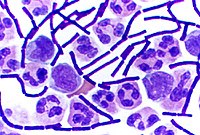
Photo from wikipedia
Protonectin was a typical amphiphilic antimicrobial peptide with potent antimicrobial activity against Gram-positive and Gram-negative bacteria. In the present study, when its eleventh amino acid in the sequence was substituted… Click to show full abstract
Protonectin was a typical amphiphilic antimicrobial peptide with potent antimicrobial activity against Gram-positive and Gram-negative bacteria. In the present study, when its eleventh amino acid in the sequence was substituted by phenylalanine, the analog named phe-Prt showed potent antimicrobial activity against Gram-positive bacteria, but no antimicrobial activity against Gram-negative bacteria, indicating a significant selectivity between Gram-positive bacteria and Gram-negative bacteria. However, when Gram-negative bacteria were incubated with EDTA, the bacteria were susceptible to phe-Prt. Next, the binding effect of phe-Prt with LPS was determined. Our result showed that LPS could hamper the bactericidal activity of phe-Prt against Gram-positive bacteria. The result of zeta potential assay further confirmed the binding effect of phe-Prt with LPS for it could neutralize the surface charge of E. coli and LPS. Then, the effect of phe-Prt on the integrity of outer membrane of Gram-negative bacteria was determined. Our results showed that phe-Prt had a much weaker disturbance to the outer membrane of Gram-negative bacteria than the parent peptide protonectin. In summary, the introduction of L-phenylalanine into the sequence of antimicrobial peptide protonectin made phe-Prt show significant selectivity against Gram-positive bacteria, which could partly be attributed to the delay effect of LPS for phe-Prt to access to cell membrane. Although further study is still needed to clarify the exact mechanism of selectivity, the present study provided a strategy to develop antimicrobial peptides with selectivity toward Gram-positive and Gram-negative bacteria.
Journal Title: Amino acids
Year Published: 2020
Link to full text (if available)
Share on Social Media: Sign Up to like & get
recommendations!